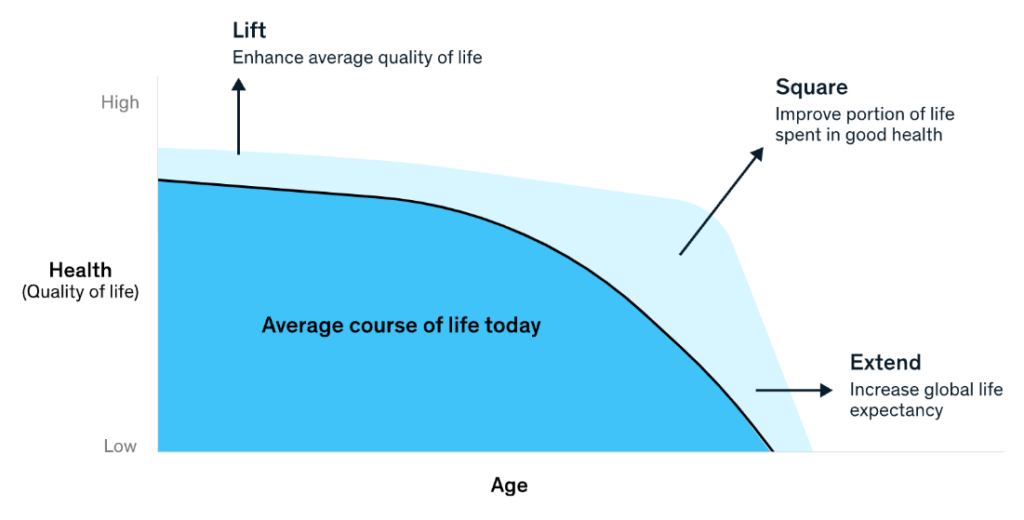Longevity medicine, also known as anti-aging medicine, is a rapidly growing field that focuses on optimizing health and extending lifespan and healthspan. While “lifespan” is about the number of years in one’s life, “healthspan” is referring to the quality of those years.
Here at the Forbes Longevity Center we consider that it is our obligation to live longer and healthier. We each have a duty do our families, friends, our companies, and our society to be vital and productive. How much more can we do for the world, how much more can we experience with our loved ones if we live well for another 10 or 20 years?

What is Longevity Medicine?
Here are five things that longevity medicine can do for someone:
- Reduce the risk of age-related diseases: Longevity medicine focuses on preventing or treating age-related diseases such as cancer, diabetes, cardiovascular disease, and neurodegenerative disorders. By optimizing health and reducing risk factors, longevity medicine can help individuals maintain their health and prevent the onset of these diseases.
- Improve overall health and well-being: Longevity medicine takes a holistic approach to health, looking at the whole person and addressing lifestyle factors such as nutrition, exercise, sleep, stress, and environmental factors. By optimizing these factors, longevity medicine can improve overall health and well-being.
- Increase lifespan: The ultimate goal of longevity medicine is to extend lifespan. While this is a complex goal that requires a multifaceted approach, studies have shown that certain interventions such as caloric restriction, exercise, and certain supplements may increase lifespan in animal models.
- Enhance cognitive function: Longevity medicine recognizes the importance of maintaining cognitive function as we age. Through lifestyle modifications, dietary interventions, and supplementation, longevity medicine can enhance cognitive function and prevent cognitive decline.
- Improve quality of life: By optimizing health and reducing the risk of age-related diseases, longevity medicine can improve the quality of life for individuals. This includes reducing pain and disability, maintaining independence, and improving overall physical and mental function.
Longevity medicine, like any medical intervention, carries potential risks and benefits, and safety depends on the specific interventions used and the expertise of the practitioner. However, the goal of longevity medicine is to optimize health and prevent or treat age-related diseases, so the interventions used are generally safe and non-invasive.
“Research has shown that lifestyle modifications such as regular exercise, a healthy diet, stress reduction, and adequate sleep can improve health and reduce the risk of age-related diseases.”
Tarin
Some interventions used in longevity medicine, such as dietary modifications, exercise, stress reduction, and sleep optimization, are considered low-risk and have been shown to have numerous health benefits. Other interventions, such as peptide therapy, regenerative therapy such as PRP, certain supplements or hormone replacement therapy, may carry more risk and should only be used under the guidance of a qualified healthcare practitioner, such as the team here at Forbes Longevity Center.
It is important to note that while longevity medicine may be beneficial for some individuals, it is not a one-size-fits-all approach. Here at our center, with the FLC Exam, we tailor your program to your unique health status and goals. Your concierge health experience here at Forbes, is controlled by qualified healthcare practitioners who are knowledgeable and experienced in longevity medicine to ensure everything you do is safe, effective, and uniquely designed for you.
What are Examples of Longevity Medicine?
One example is the use of caloric restriction or intermittent fasting, which has been shown to increase lifespan and improve health in animal models. Studies have also shown that certain supplements such as resveratrol and NAD+ precursors can improve markers of aging and increase lifespan in animal models.
Another example is the use of hormone replacement therapy, particularly for women going through menopause. Hormone replacement therapy has been shown to reduce the risk of osteoporosis, dementia, and cardiovascular disease, three common age-related conditions.
In addition, research has shown that lifestyle modifications such as regular exercise, a healthy diet, stress reduction, and adequate sleep can improve health and reduce the risk of age-related diseases.
Longevity Medicine Frequently Asked Questions
What is longevity medicine?
Longevity medicine is a branch of medicine that focuses on optimizing health and extending lifespan and healthspan. It aims to prevent or treat age-related diseases and maintain health and wellness as people age.
What is Lifespan?
Lifespan refers to the total length of time that an individual lives, from birth to death. It is a measure of the duration of life, without regard to the quality of health or functional independence during that time.
Lifespan is influenced by a wide range of factors, including genetics, lifestyle, environment, and access to healthcare. While increasing lifespan has been a primary focus of medical research for many years, there is now growing interest in finding ways to extend healthspan and promote healthy aging, in order to help people live longer, healthier lives.
What is Healthspan?
Healthspan refers to the period of life during which an individual is generally healthy and free from serious or chronic illnesses or disabilities. It is essentially the length of time that a person is able to live in good health and with functional independence, as opposed to simply living longer but with a lower quality of life due to illness or disability.
The concept of healthspan is often used in contrast to the more traditional concept of lifespan, which refers to the total length of time that an individual lives, regardless of their health status. While increasing lifespan has been a primary focus of medical research for many years, there is now growing interest in finding ways to extend healthspan and promote healthy aging, in order to help people live longer, healthier lives.
What are some interventions used in longevity medicine?
Interventions used in longevity medicine can include dietary modifications, exercise, stress reduction, sleep optimization, supplements, peptide therapy, regenerative therapies such as PRP, and hormone replacement therapy. The specific interventions used will depend on an individual’s unique health status and goals.
Can longevity medicine really extend lifespan?
Research has shown that certain interventions such as caloric restriction, exercise, and certain supplements may increase lifespan in animal models. However, it is important to note that the effectiveness of these interventions in humans is still being studied, and not all interventions will work for everyone.
Is longevity medicine safe?
Longevity medicine interventions are generally considered safe and non-invasive, particularly lifestyle modifications such as exercise and dietary changes. However, certain interventions such as hormone replacement therapy, peptide therapy, regenerative therapies such as PRP, or high-dose supplementation may carry more risk and should only be used under the guidance of a qualified healthcare practitioner.
When should someone start thinking about longevity medicine?
There is no set age when someone should start thinking about longevity medicine. However, lifestyle modifications such as exercise, healthy eating, and stress reduction can be beneficial at any age. It is important to discuss any specific concerns or goals with a qualified healthcare practitioner.
I hope all this helps you to better understand what we do at Forbes and also to simply understand how to approach and improve your health. Don’t hesitate to call us to set up an appointment and see how we can help you.
To your greatest life!
Tarin



